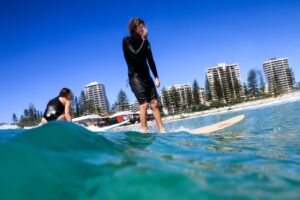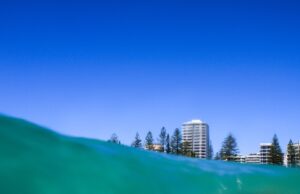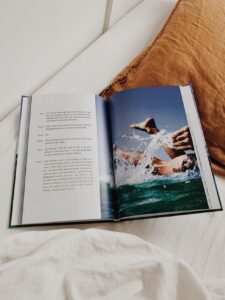In order to move beyond the conventional separation of the land and the sea, anthropologist Tim Ingold acknowledges the potential of the following mind experiment; “What if, instead of land-ing the sea, we try to sea-ing the land?” Sea-ing the land, so he argues, opens the possibility to doubt the solidarity of the ground and sea the world in ceaseless motion and change. Ultimately, this approach entails that the sea is recognized as an active participant in social processes which happen on and around it. By sea-ing the land, the conception of place is broadened and recognizes rights not only to the land, but also to the sea. This mind experiment opens both an alternative perception of the sea and undermines the on-going supremacy of the land. Ultimately, it refuses a the cartesian perception of a nature-culture dichotomy, as the sea is perceived as an integral part of culture.

Surfing creates the possibility to look at the land from a physically different perspective and to put Ingold’s mind experiment into reality. For surfers, the perception of the world and the sense of place does not end where the land ends. As with the land, the sea is also bound into their everyday practices; “For many people, surfing defines their way of life, their manner of living – in short, their culture. Surfers organize their lives around the rhythms of the tides and the seasons that determine when, and where, the surf runs” (Booth 2017, 318). With the increased tensions of the twentieth century urban living, surfing started to emerge as an escape from the capitalist society in cities and as a return to nature’s reality. However, what was once a lifestyle of some independent surfers, has now turned into a multi-billion-dollar global industry.
Even though the surfers’ freedom is perceived, presented, and constructed as a) distinct from the global market and b) transcending the human-nature divide, its connection to capitalism through the processes of consumer culture and commodification contests these notions. This raises questions about, how surfers nowadays enac t and construct this freedom in a capitalist society, and how this influences their perception of the land and the sea. By exploring the surfers’ perception of freedom in Australia, I tried to gain insight into the interplay of freedom and capitalism, and furthermore into the relationship between the land and the sea, thus culture and nature. I explored the everyday lives of surfers in Rainbow Bay, Australia, to illustrate the meaning of freedom to surfers living in a neoliberal era where the capitalist logic of value has taken over the world.
t and construct this freedom in a capitalist society, and how this influences their perception of the land and the sea. By exploring the surfers’ perception of freedom in Australia, I tried to gain insight into the interplay of freedom and capitalism, and furthermore into the relationship between the land and the sea, thus culture and nature. I explored the everyday lives of surfers in Rainbow Bay, Australia, to illustrate the meaning of freedom to surfers living in a neoliberal era where the capitalist logic of value has taken over the world.
I wanted to highlight the multifaceted characteristics of the concept of freedom and how the capitalist processes of commodification and consumption contest this notion on the one hand, whilst at the same time form the crucial basis of the surfers’ freedom. Secondly, I also aimed to outline a way in which the sea is not a material or metaphorical void, but alive with embodied human experiences as well as being a place with character, agency, and personality. The cultural lens of surfing enabled me to physically get into the perspective of “sea-ing the land”. By physically looking at the land from the perspective of the sea through the act of surfing, I contested the terrestrial perception of the human-sea division. The aim was to enhance empathetic forms of understanding the seascape by telling the story of a community whose perception of freedom is based on living with the rhythm of the sea. This is important because the understanding of the sea and how we perceive our relationship with it has a relevance to how we as humans work to preserve or deplete the ocean.
Photobook and Short Movie
To (re)present the findings not only within academia but also to a broader public, I have created a photobook which combines quotes, a brief anthropological analysis and visual material to contest the conventional separation of the land and the sea. The short (10min) immersive, sensory movie creates a lived experience of the Australian surfing community by mashing up video and audio fragments. These two ways of presenting scientific knowledge aim to go beyond the written word and to rather to only tell a life by the sea.
To see the whole film or read the whole thesis, please get in touch with me: [email protected].
Website: https://kyralenting.com,
Link to the movie trailer:https://www.youtube.com/watch?v=L-ksrp2TedI
Link to the bookshop: https://www.bravenewbooks.nl/site/?r=userwebsite/index&id=kyralenting/bookdetails/265307
Kyra Lenting is currently a junior teacher at Utrecht University in the Netherlands. Next to being a passionate surfer, she is also an artist. Her motto is: “I am not an artist or an anthropologist. I am an arthropologist. I combine different media of art with research methods of anthropology.” She aims to explore the junction between academia, art, and multimedia technology to communicate complex topics through creative narratives. She mainly focuses on topics related to human-ocean relationships and sustainability and is now looking for a PhD to continue her research.
